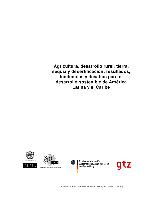Location
As a service provider in the field of international cooperation for sustainable development and international education work, we are dedicated to shaping a future worth living around the world. We have over 50 years of experience in a wide variety of areas, including economic development and employment promotion, energy and the environment, and peace and security. The diverse expertise of our federal enterprise is in demand around the globe – from the German Government, European Union institutions, the United Nations, the private sector, and governments of other countries. We work with businesses, civil society actors and research institutions, fostering successful interaction between development policy and other policy fields and areas of activity. Our main commissioning party is the German Federal Ministry for Economic Cooperation and Development (BMZ). The commissioning parties and cooperation partners all place their trust in GIZ, and we work with them to generate ideas for political, social and economic change, to develop these into concrete plans and to implement them. Since we are a public-benefit federal enterprise, German and European values are central to our work. Together with our partners in national governments worldwide and cooperation partners from the worlds of business, research and civil society, we work flexibly to deliver effective solutions that offer people better prospects and sustainably improve their living conditions.
Members:
Resources
Displaying 271 - 275 of 340Agricultura, desarrollo rural, tierra, sequía y desertificación: resultados, tendencias y desafíos para el desarrollo sostenible de América Latina y el Caribe
En el presente documento se analizan los principales temas relacionados con el desarrollo agropecuario y rural, y la situación del medio ambiente y los recursos naturales de América Latina y el Caribe en el período 1990 a 2005. El documento está estructurado en torno a cinco ejes temáticos: i) desarrollo productivo; ii) deforestación; iii) degradación y desertificación; iv) factores sociales y demográficos, pobreza, ingreso y empleo, y cambios poblacionales, y v) cambio climático y desastres naturales.
The Horn of Africa: confl ict prevention through regional mechanisms
The Horn of Africa is one of the most conflict-prone areas of the world. It is also home to about 20 million pastoralists, which keep moving with their livestock in search for grazing land and water points. Pastoral conflicts are becoming more and more serious. CEWARN - a regional mechanism for preventing conflicts - tries to close the gap between 'early warning' and 'early response'.
Study on urban land management and planning in Lao PDR
This study analyzes the institutional landscape, processes and track record of urban planning and land management in Lao PDR, and makes recommendations to improve future planning and land management policies in the urban sector.
Study on communal land registration in Lao PDR
Field visits to over twenty villages in five different provinces of the Lao PDR have shown that across all ethnic groups, communities use and manage communal lands. Types of lands often found to be under communal management include upland areas, grazing lands and village use and sacred forests. Communities and use groups have devised local rules for provision, management and appropriation of communal resources. Valuable lessons for the process of recognizing communal land rights can also be drawn from two neighbouring countries.
Best Practices for Sustainable Forest Management in Southeast Asia
Despite a long history of forest conversion and forest degradation due to unsustainable logging practices, the natural forests of Southeast Asia still constitute an immense renewable resource and provide vital contributions to the economic and social development of the region. Invariably, the countries of the region commit to the principle of sustainable forest management (SFM), as expressed in their respective forest policies and/or sector strategies. In line with the international policy debate (e.g.





